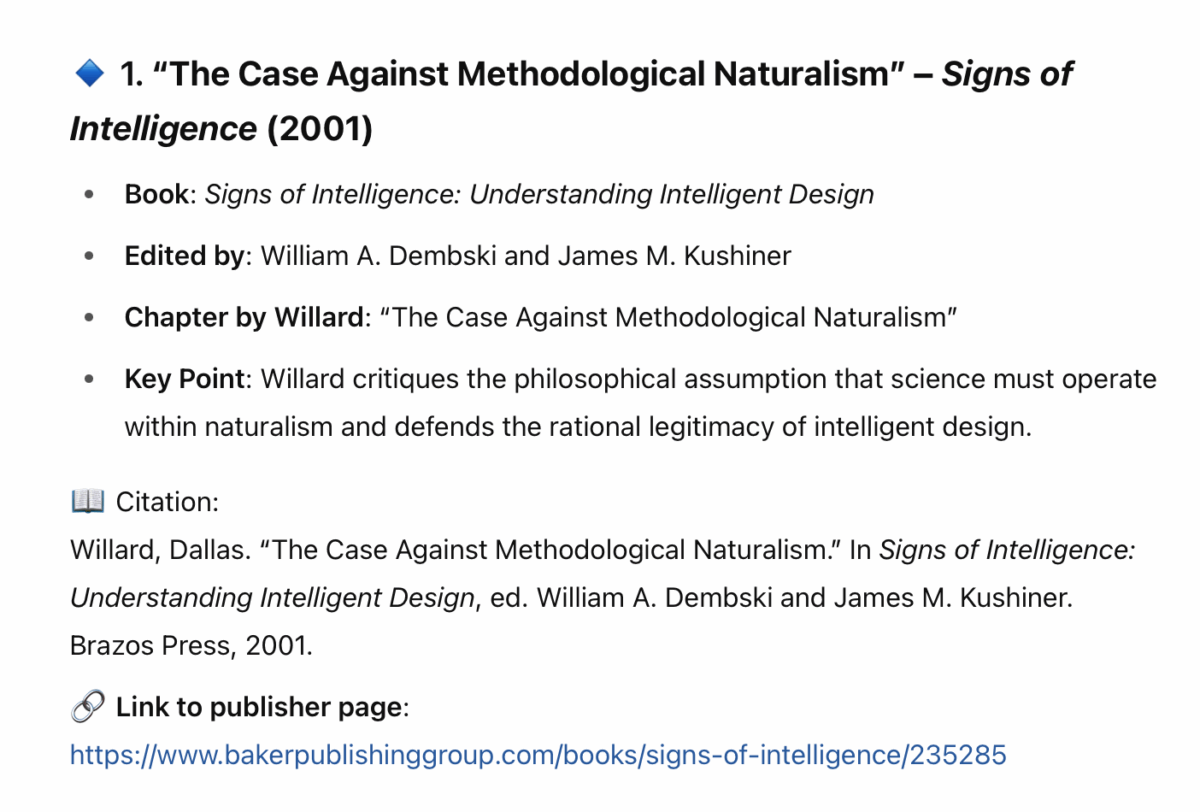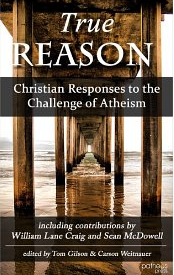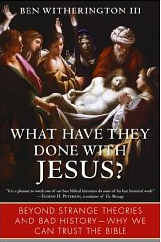Dallas Willard on Intelligent Design
To me, as to many, Dallas Willard was a gentle giant. Through his books like Spirit of the Disciplines and The Divine Conspiracy, he indelibly shaped my understanding of the way of Jesus and his followers. Even more so, Willard’s former students like philosophers J.P. Moreland and Doug Geivett further kneaded his way of thinking into my own. Philosophically, when Willard wasn’t busy bringing Husserl down off the top shelf for his students, I appreciated his simple and stalwart defense of a common sense understanding of truth. Simply stated, “A belief or idea (a statement or a proposition) is true provided that what it is about is as it is represented in the belief, statement, or so forth.“ More concretely, “Truth reveals reality, and reality can be described as what we humans run into when we are wrong, a collision in which we always lose.”
I had not been aware of Willard’s views on intelligent design. Recently rereading his posthumously published Allure of Gentleness piqued my curiosity. The book commends regarding the role of the apologist as a servant helping doubters of all kinds, not as a combatant gunning down the enemy. To that end, it sketches out the kinds of evidence one might gently bring to bear in addressing a truth seeker’s questions. Willard’s case includes evidence from design in nature and a stiff rebuke to scientism.
Mind the Inference
For Willard, order in the natural world is evidence of an intelligent mind. He echoes a key premise that intelligent design theorists make in their abductive inferences to the best explanation.
The one place we know order comes from is minds. Nearly everything you see around you, except you, was produced by a mind. We constantly experience order coming from human minds into physical reality, whether it is chocolate cakes, space shuttles, or computers. Now, it’s been proven that there is a preexisting material that minds work on, but we all know that those things causally depend upon minds conceiving them and fashioning them. And we have experience that would lead us not to believe anything else about order generally. A creative mind lies behind the physical world. You can read all about that in the first chapter of Genesis. And read again in Romans 1 these words from Paul: “Ever since the creation of the world his eternal power and divine nature, invisible though they are, have been understood and seen through the things he has made. So they are without excuse.” And Hebrews 11:3: “By faith we understand that the worlds were prepared by the word of God, so that what is seen [the creation] was made from things that are not visible.” Relative to our data, then, we must believe that the first cause of physical reality would also be a mind, and a sufficiently great mind at that.
Dallas Willard. The Allure of Gentleness (HarperOne)
Here Willard echoes the design inference, that we can know the kinds of things that are the product of a mind. Based on this insight, can we infer from aspects of the natural world that they too are the product of intentionality?
Against Scientism and Separation
Willard was not overawed by the scientific enterprise, and far from confining science and faith to their own magisteria, where never the twain shall meet, he observed that as two knowledge disciplines, their integration where they overlap can be trying. As such, pursuing harmony between scientific hypotheses and biblical claims is necessary. Not only that, but he expected convergence, that scientific discoveries would continue to serve as a powerful reassurance of religious truths.
I praise God for science. I believe it is his work. If you know the history of science, you must agree that it’s of God, because human beings are just staggering through it. It may interest you to look at Arthur Koestler’s book The Sleepwalkers, in which he discusses many of the great figures in the rise of modern science. The “reconciliation” of science and the Bible is a serious task, because they are both so fundamental to humankind’s call to be responsible children of God. Scientific hypotheses are held tentatively, whereas biblical truth is eternal. It is not necessary to have total reconciliation of the two, yet some amount of harmony is required. And understanding their interrelations is not easy. I truly believe that God’s hand is in history in the form of the development of technology and science. I believe it is a part of his plan to approach us through human history, and I think there will be science and technology in heaven too. I’m thankful for the scientific advances we have seen in our day, because I am sure that the more we learn, the more we’re going to be assured that, indeed, what the Bible says about creation and physical reality is true. I’m sure of it, and I can’t wait.
Dallas Willard. The Allure of Gentleness (HarperOne)
Against Deism
Willard rejected any deistic conception of God’s relation to his creation. Where suggests it’s belittling of God to think he would remain involved, Peanut Butter example
Mixed Signals
I knew that John Ortberg, one of the foremost popularizers of Willard’s thought, is also a well-known proponent of theistic evolution and is on the Advisory Council of Biologos. Willard even attended a Biologos workshop — In Search of a Theology of Celebration — in 2009. Relevant to my inquiry, he did not return in 2010 and is not a signatory to the statement drafted there, that “… the diversity of life is best explained as a result of an evolutionary process”.
Willard was also the editor of A Place for Truth, a compendium of Veritas Forum talks that prominently featured a talk by Francis Collins. Revisiting his sentiments in The Language of God, Collins assured the audience that, despite appearances, “parts of the bacterial flagellar motor have been recruited bit by bit from other structures and used in a way that gradually built up its capacity to serve the function that we now so admire.” The Forum transcripts seem largely unedited and I don’t know whether Collins’ inclusion was at Willard’s sole discretion, nor what to make of it if it was.
Wondering if I might be reading too much between the lines in The Allure of Gentleness, I searched to see if Willard had spoken of intelligent design by name.
On The Blind Watchmaker
Thanks to the work of his family collecting and archiving his papers, Dallas Willard’s website is a treasure trove of his thinking on many matters. One gem is a lengthy, unpublished review of Richard Dawkins’ bestselling 1986 book, The Blind Watchmaker. There he poses the question explicitly:
What logical relation, if any, does the theory of evolution have to the argument from the existence of order in the world of nature to the existence of a mind as causal source of (significant aspects of) the world of nature?
Dallas Willard, “Reflections on Dawkins’ The Blind Watchmaker” (1986)
At this point in Willard’s thinking, evidence of design in biology was not essential to teleological arguments for God.
In my own view, living organisms simply have nothing essentially to do with the heart of arguments from order to God, and hence I regard theories of biological evolution as beside the point of “design” arguments for God’s existence.
Ibid
Nevertheless, Willard’s withering review finds nothing persuasive in Dawkins’ defense of blind watchmaking or “speciesmaking”, nor a solution to the “problem” of “complex design”. He credits still less to the case for cosmic Darwinism, Dawkins’ attempt to explain the preexisting state of affairs required for biological evolution to get off the ground.
Speaking of Dawkins’ computer simulations of supposedly unguided evolutionary processes, Willard notes the crucial point, that the “computer exercises are precisely the result of a rational planner”.
Such exercises are aimed at “ramming home the importance of gradual, step-by-step change.” If the conclusion to be drawn is that current and extinct forms of life such as we are acquainted with here on planet earth could have come into existence through tiny modifications in reproduction of yet other, simpler life forms over unimaginably long periods of time, without intervention by a rational planner who is working toward a goal, then I can only insist that no such conclusion follows. The computer exercises are precisely the result of a rational planner. The more modest conclusion — that certain processes set up but not directly guided by rational intention at each step can, under conceivable circumstances, produce surprisingly ordered results — should no doubt be conceded. But this does not seem to me even to render it faintly probable that the astonishing complexity of living forms could have evolved from simple forms of the sort usually referred to — much less to lend evidence to the view that they actually did so evolve.
Ibid
Prefiguring his low regard for scientism in The Allure of Gentleness, Willard also noticed how Dawkin’s writing fits in a “romance of science” genre, as Dawkins melodramatically scores his work to an epic score.
I still cannot conceal from you my feeling of exultation as I first watched these exquisite creatures emerging before my eyes. I distinctly heard the triumphal opening chords of Also sprach Zarathustra the 2001 theme’) in my mind. I couldn’t eat, and that night “my” insects swarmed behind my eyelids as I tried to sleep.
Richard Dawkins, The Blind Watchmaker (1996), p. 60.
A Growing Interest
Even with his apparent dismissiveness toward the relevance of evidence of design in biology at the time, by 1999 Dallas Willard had taken a serious interest in intelligent design and blurbed William Dembski’s seminal book.
Intelligent Design is a centerpiece in the current renewal of intellectual responsibility among thoughtful Christians. Everyone with interest in and responsibility for how science and theology interrelate should study it carefully.
In 2003, Francis J. Beckwith included him on a list of scholars supportive of intelligent design. More telling, Willard made clear in notes for a 2005 USC Templeton Lecture that he stood for academic freedom regarding evolutionary theory and its alternatives. There he defined intelligent design thusly:
In the sense relevant here, a design is an arrangement of elements to form a larger whole, typically a whole that serves some larger function. It can be synchronic or diachronic. A checkerboard has a design, as does an egg or the leaf of a tree or a park or a dance.
Some things with a design (of course everything has one) we know to have been originated through a process essentially involving thought or, more inclusively, mind. Birthday cakes, art works, 747s, checkerboards, hamburgers. “Design” as a verb always involves thought.
An intelligent design is one the causation for which involves mental processes. Obviously, intelligent designs exist. They are all around us. There is even an occupational field known as “Design.”
Obversely,
A non-intelligent design would be one the causation for which does not involve mental processes. There seem to be a lot of such designs around us. Everything from solar systems and galaxies, to geological strata, to tree leaves, birds and rabbits. Non-intelligent designs that we know of always originate from previously existing things, which of course have designs.
Dallas Willard, “Notes for Two Talks on Intelligent Design, Evolution, and the Purpose of Education“, dwillard.org (2005)
When I speak here of evolution, I refer to the process more clearly designated as “natural selection.” This is a process whereby living things undergo transformation through interaction with the environment, possibly even giving rise to other species of living things.
Evolution as natural selection is a highly accredited theory in Biology or the Biological Sciences. It has immense explanatory power within the proper range of its applicability and the types of mechanisms and processes that it invokes in its explanations are at home in the physical world, where the natural sciences carry out their investigations. This is not true of the claims of “Intelligent Design” and it is not true of “evolution” when it is pushed beyond the functioning and interrelations of living species and their parts and properties.
Evolution is itself a diachronic design, like erosion. It is no more self-explanatory or all-explanatory than is erosion. What the causes and conditions are of there being a world in which evolution occurs is not even addressed, much less answered, by natural selection. Evolution did not evolve out of something else and is not a self-subsistent being. In the NYT article on “Intelligent Spaghetti” (8/29, ’05, p. B3), language like this occurs: “This month, the Kansas State Board of Education gave preliminary approval to allow teaching alternatives to evolution like intelligent design (the theory that a smart being designed the universe).” And “…he <Mr. Henderson> agreed that science students should ‘hear multiple viewpoints’ of how the universe came to be.” And that’s where the Flying Spaghetti Monster comes in—if that’s the way to put it. Now ask yourself: Is evolution (natural selection) one alternative theory of what or who designed the universe, or of how the universe came to be? If you think it is, you are ready to step right into the ball of confusion that is the current imbroglio around the words “intelligent design.”
Teach the Controversy
Dallas Willard emphasized that education aimed at the truth about reality is purposely and inherently subversive, able to destabilize established orthodoxies and pet theories that are in error.
I assume that the purpose of education, as a human enterprise, is to equip individuals to deal with reality (what you run into when you are wrong), and that this includes putting them into possession of facts and values of various ranges and training them to distinguish facts and valuable values from fictions and bum steers, especially with respect to the traditions and institutions within which they must live, including those of family, nation, education, sciences and arts, religion and politics. Because institutions are always more interested in survival and domination than in facts and methods for finding them, education — though not everything that goes by that name — is always subversive, not least of one’s own opinions and habits.
Ibid
Indeed, he articulated the philosophy of education Discovery Institute has championed for years: Teach the Controversy. As he put it at the time: Speaking directly to an issue of academic freedom,
With respect to the teaching of evolution in the public schools, surely the spirit of Darwin and of great scientists through the ages is that no question should be ducked or obfuscated or avoided. This would mean, above all, that the theory — whatever it might be, in whatever domain — must face the hard questions. How can you honestly teach evolution if you do not face the hard questions — and not defensively, but with fairness and enthusiasm. You can’t defend “good science” teaching in the schools by identifying “good science” with specific theories sheltered from alternatives. Increasingly, today, “good thinking or research” is identified with coming to the “right” conclusions. We used to teach that you evaluated a conclusion, for its rational standing, by the arguments that might back it up. Now, increasingly, the argument is evaluated, to be brushed off, by whether or not it comes out with the “right” conclusion. If it doesn’t, the reasoning offered must be wrong, and the motives of the person on the other side must be bad. But, surely, the detailed work of open and thorough inquiry is what you want to involve students in if you wish to educate them in matters of science or matters of society.
Ibid
Detecting Design
design.”4 The almost irresistible impression of a “maker” of the physical universe is no doubt what Paul was … intelligent author; and no rational enquirer can, after serious reflection, suspend his belief a moment with regard to the
Epictetus, a famous Stoic philosopher contemporary to Paul, assigned the pervasive order in physical reality to the goodwill of God or “Providence”: “From the very construction of a complete work, we are used to declare positively that it must be the operation of some artificer, and not the effect of mere chance. Does every such work then demonstrate an artificer, and visible objects not do so?” Is not the order in things, an order obvious to thought, “sufficient to prevail on men and make them ashamed of leaving an artificer out of their scheme?…Let them explain to us…how it is possible that things so wonderful, and which carry such marks of contrivance, should come to pass spontaneously and without design.”
The almost irresistible impression of a “maker” of the physical universe is no doubt what Paul was referring to when he claimed that the existence and nature of God was “plain” or “shown” to humans. This impression remains very strong up to today. David Hume, often thought to be the prince of modern skeptics, conceded: “The whole frame of nature bespeaks an intelligent author; and no rational enquirer can, after serious reflection, suspend his belief a moment with regard to the primary principles of genuine Theism and Religion.”5 This same outlook survives in the later, carefully guarded concession of Hume’s “Philo,” in the posthumously published Dialogues Concerning Natural Religion, “That the cause or causes of order in the universe probably bear some remote analogy to human intelligence.”
Misunderstandings of Darwin’s theory of “natural selection” have in more recent times blunted the impact of the reasoning behind this conclusion in the minds of people generally. But in recent years an increased understanding of the astonishing complexity of life has led some who were longtime atheists to reconsider their position. In any case, the complexity and order of the physical universe reaches far beyond, and is prior to, the complexity of living beings, to which Darwin’s theory applies; and that prior order would have been there even if life and evolution had never occurred. (Of course, we, then, would know nothing about it or about anything else!)
Dallas Willard, Knowing Christ Today (HarperCollins), pp. 95-6, Kindle Edition.
Taking it farther than merely the obvious need to keep evolutionary theories open to questioning, Willard suggested that intelligent design is a question that can be entertained.
The question of Intelligent Design can be a question about the limits of what can be explained, about living organisms or other things, by “Natural Selection.” There is nothing wrong with these questions, and if you try to shut them down you will simply arouse legitimate suspicions in thoughtful minds. Not the business of the educator, one might think.
Ibid
Methodological naturalism was, for Willard, an unnecessary and artificial constraint on scientific inquiry, no matter the political or social implications.
It is not a priori or empirically clear, much less established, that every possible kind or quantity of design is explicable wholly in terms of non-intelligent design, that is, without the causal intervention of some mind or other. … It is perfectly permissible, if not necessary, to raise the question of the limits of explanation in terms of non-intelligent causes. It is a reasonably clear question, and one with considerable significance for our understanding of the universe. It may be that it represents a futile quest, and one easily misguided. It may involve a question that is politically dangerous, socially unsettling or individually disastrous. But we should know by now that this is all to be expected in serious intellectual work, and we should know by now that repressive orthodoxy can show up anywhere. Even in universities supposed to be “secular.” Secularism is no protection from folly.
For his part, the question was still open. Contra scientism, Willard rejected the notion of a monolithic science that had provided a universal theory of all the facts discovered in various scientific disciplines.
None of the individual sciences have closed that question off, and it is not clear how they could even address the question, given their subject matters and methods. And there is, in fact, no such thing as a SCIENCE, in addition to the particular sciences, that has competence over universal questions about reality or knowledge. Such a “Science” is an illusion, sustained largely by philosophers who hope to cloak themselves in an authority not based on reason or experiment, to advance all-inclusive views about knowledge and reality.
Ibid
Early on, Willard didn’t see the relevance of biological organisms to the design argument.
Overreaching
He expressed some concern that intelligent design theorists, like evolutionists, had gotten too far out over their skis.
On Causal Closure
This in turn threatens many scientists and those who like to think of themselves as scientific, because they think something not physical (or at least “natural”) threatens their results. They go for “causal closure” of the physical universe as a defensive move, though causal closure has vast implications for the understanding of human life and the universe (one would think that anyone who thought the universe had a beginning would have to give up causal closure at the beginning, and why, then, worry about it later), and to rationally defend causal closure, not just shout about it, is a huge metaphysical project, and not something any science actually proves.
“Notes for Two Talks on Intelligent Design” at dwillard.org.
On Method and Causal Closure
alternative that the physical universe had no cause at all. There is a principle that many investigators accept as a truth guiding the investigation of nature. It holds that every physical event has a physical cause. This is called the “causal closure” of the physical domain. It is a sensible, practical rule that, when involved in investigations of physical phenomena, we should look for physical causes. (In “research” it could still be a good rule to look only for physical or at least “nonsupernatural” causes of physical things and events, but without any dogmatic assumptions about reality as a whole, or about what must be the case in the physical universe.) But to take this rule as a practical guide for individual investigations is not the same as asserting the “causal closure” of the whole physical domain; namely, that every physical event or thing has a physical cause.
Dallas Willard, Knowing Christ Today (HarperCollins), p. 98, Kindle Edition.
ChatGPT fabricated citation
Confusion from Francis Bekwith’s Essary?







